Austin K2/Y
The Austin K2/Y is a British heavy military ambulance that was used by all Commonwealth services during the Second World War. Built by Austin, it was based on the civilian Austin K30 light truck, differing mainly by having simple canvas closures in place of driver's cab doors.
| Austin K2/Y Ambulance | |
|---|---|
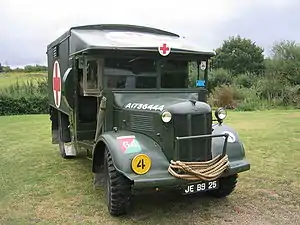 An original fully restored Austin K2/Y ambulance | |
| Type | Military ambulance |
| Place of origin | UK |
| Service history | |
| In service | Second World War and after in a number of countries |
| Production history | |
| Manufacturer | Austin and Mann Egerton |
| Produced | 1939 – 1945 |
| No. built | 13,102 |
| Specifications | |
| Mass | 3 tons 1½ cwt (3124 kg) (dry) |
| Length | 18 ft (5.49 m) |
| Width | 7 ft 5 in (2.26 m) |
| Height | 9 ft 2 in (2.79 m) |
| Crew | 2 – 3 |
| Armour | None |
| Engine | Austin 6-cylinder, 3462 cc, petrol, 60 hp at 3000 rpm, 153 lbfft (207.4 Nm) at 1200 rpm |
| Payload capacity | 4 stretchers or 10 "walking wounded" |
| Suspension | Wheels 4 × 2, 10.50 – 16 tyres |
| Maximum speed | 50 mph (80 km/h) |
The K2/Y could take ten casualties sitting or four stretcher cases. The rear body, known as No. 2 Mk I/L was developed by the Royal Army Medical Corps and built by coachbuilder Mann Egerton. The interior dimensions were approximately 2.6 metres long, 2.0 metres wide and 1.7 metres high. At the rear of the vehicle there were two large doors. From the driver's cab the wounded could also be accessed through a small internal door with a seat. The exterior was mainly made from painted canvas.
One veteran of the North African Campaign stated he once managed to carry 27 wounded, with passengers seated on the wings, bonnet, rear steps, and in extra stretchers suspended by rifles across the rear walkway; he was mentioned in dispatches for this feat.
A total of 13,102 Austin K2/Y ambulances (the front mudguards ended at the 'doors') were built at the company's Longbridge plant almost continuously from 1940 until the war ended. An estimated 50 or more[1] remain today. The Austin chassis was one of three main designs fitted with Mann Egerton bodies, the others being Morris Commercial CS11/30F (the front mudguards ended underneath the rungs) and Bedford ML 54 (the front mudguards ended before the 'doors'). It is estimated there are two remaining Morris Commercials, but no Bedford examples are said to survive.
The Austin K2/Y was generally regarded as having a widely spaced four-speed gearbox that needed to be "understood", but once mastered provided good service. It had two petrol tanks, one on each side (total capacity: approx. 2 × 12 Imperial gallons (2 × 54.5 l)). The top speed was around 50 mph (80 km/h).
There were two versions of this ambulance: The early version had two round spinning ventilators on the roof and a spare wheel cover with a large hump. The late version had two square fixed vents on the roof and a spare-wheel cover with a much smaller and rounder hump (as the spare wheel was moved further into the body to stop drivers hitting the cover (and wheel) when passing other vehicles; hence the cut-out in the internal door was made larger).
The then Princess Elizabeth was trained to drive one during the war.[2][3][4]
The design was popular with British and Commonwealth troops, as well as American forces which received them in reverse Lend-Lease. The K2 (KTwo) was often affectionately nicknamed "Katy", also by British and US troopers in occupied Germany of the 1950s.
The K2/Y ambulance was also used in the Korean War.
It had a central role in the 1958 film Ice Cold in Alex (a WW II drama) featuring John Mills,[5] Sylvia Syms, Anthony Quayle and Harry Andrews. The film is based on the novel of the same name (1957) by British author Christopher Landon.
Three Austin K2/Y ambulances participated in the VE-VJ days 50th anniversary parade down the Mall in London on 19 August 1995.[4][6]
Gallery
Exterior and interior
 Princess Elizabeth in the Auxiliary Territorial Service (ATS) in front of an Austin K2/Y Ambulance, April 1945.[2][3]
Princess Elizabeth in the Auxiliary Territorial Service (ATS) in front of an Austin K2/Y Ambulance, April 1945.[2][3] Princess Elizabeth, a 2nd Subaltern in the Auxiliary Territorial Service, wearing overalls and standing in front of an L-plated truck. In the background is an Austin K2/Y Ambulance, 1945.
Princess Elizabeth, a 2nd Subaltern in the Auxiliary Territorial Service, wearing overalls and standing in front of an L-plated truck. In the background is an Austin K2/Y Ambulance, 1945. Rear of an Austin K2/Y Ambulance. Note the bulge for the spare wheel.
Rear of an Austin K2/Y Ambulance. Note the bulge for the spare wheel. Austin K2/Y Ambulance at the RAFBF 90th Birthday Air Show, East Kirkby, 2009.
Austin K2/Y Ambulance at the RAFBF 90th Birthday Air Show, East Kirkby, 2009.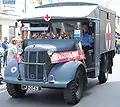 Austin K2/Y Ambulance with bell at Liberation Day, 9 May 2010, Jersey.
Austin K2/Y Ambulance with bell at Liberation Day, 9 May 2010, Jersey..jpg.webp) Austin K2/Y Ambulance at the Duxford Military Vehicles Show 6 June 2010.
Austin K2/Y Ambulance at the Duxford Military Vehicles Show 6 June 2010. Sideview of an Austin K2/Y Ambulance at the War and Peace show 2010.
Sideview of an Austin K2/Y Ambulance at the War and Peace show 2010..jpg.webp) Austin K2/Y ambulance at the RAF Museum, Hendon, 13 September 2015.
Austin K2/Y ambulance at the RAF Museum, Hendon, 13 September 2015. Austin K2/Y Ambulance at the RAF Museum, London.
Austin K2/Y Ambulance at the RAF Museum, London. Cab of an Austin K2/Y Ambulance.
Cab of an Austin K2/Y Ambulance.
In action
The photographs below show that the Austin K2/Y ambulance was used in many parts of the world during whole WW II and beyond.
 An Austin K2/Y ambulance in France, 9 May 1940.
An Austin K2/Y ambulance in France, 9 May 1940. Two women of the Auxiliary Territorial Service (ATS) add oil to the engine of an Austin K2/Y ambulance at the ATS Motor Transport Company Training Centre, probably at Camberley in Surrey, 1941. (Note that the right headlight is missing.)
Two women of the Auxiliary Territorial Service (ATS) add oil to the engine of an Austin K2/Y ambulance at the ATS Motor Transport Company Training Centre, probably at Camberley in Surrey, 1941. (Note that the right headlight is missing.)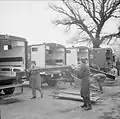 Ambulance crews of the First Aid Nursing Yeomanry (FANYs) stowing stretchers aboard their Austin K2/Y ambulances, Colchester, 3 May 1941.
Ambulance crews of the First Aid Nursing Yeomanry (FANYs) stowing stretchers aboard their Austin K2/Y ambulances, Colchester, 3 May 1941. An Austin K2/Y ambulance convoy from the Royal Army Medical Corps moving forwards in the Western Desert, 1940 – 1943.
An Austin K2/Y ambulance convoy from the Royal Army Medical Corps moving forwards in the Western Desert, 1940 – 1943. Men wait on and beside their British-made crash tender and an Austin K2/Y ambulance (note the American star), in case of emergency, as a B-17 Flying Fortress lands at an American airfield in Britain after a mission in 1943.
Men wait on and beside their British-made crash tender and an Austin K2/Y ambulance (note the American star), in case of emergency, as a B-17 Flying Fortress lands at an American airfield in Britain after a mission in 1943. A casualty, evacuated from the front line in the Arakan, Burma, by a Vultee Stinson L-5 Sentinel (left), is transferred to a waiting Austin K2/Y ambulance on arrival at a base station 1943 – 1944.
A casualty, evacuated from the front line in the Arakan, Burma, by a Vultee Stinson L-5 Sentinel (left), is transferred to a waiting Austin K2/Y ambulance on arrival at a base station 1943 – 1944. A British Army Austin K2/Y ambulance pulls up in front of a line of Douglas Dakota Mark IIIs at Catania, Sicily.
A British Army Austin K2/Y ambulance pulls up in front of a line of Douglas Dakota Mark IIIs at Catania, Sicily. A casualty is carried by Civil Defence stretcher-bearers past an Austin K2/Y of the American Ambulance Great Britain following a V-1 flying bomb attack in London, 1944.
A casualty is carried by Civil Defence stretcher-bearers past an Austin K2/Y of the American Ambulance Great Britain following a V-1 flying bomb attack in London, 1944. Casualties being evacuated back to Britain on an RAF Dakota during the Normandy Campaign, 10 July 1944. To the left is an Austin K2/Y ambulance.
Casualties being evacuated back to Britain on an RAF Dakota during the Normandy Campaign, 10 July 1944. To the left is an Austin K2/Y ambulance. Wounded men being transferred from parked Austin K2/Y ambulances to Hospital Tank Landing Ship LST 428. Casualties, including enemy wounded being evacuated from France to the United Kingdom, August 1944.
Wounded men being transferred from parked Austin K2/Y ambulances to Hospital Tank Landing Ship LST 428. Casualties, including enemy wounded being evacuated from France to the United Kingdom, August 1944. Austin K2/Y ambulances driving towards the pierhead at the Mulberry artificial harbor at Arromanches-les-Bains, September 1944.
Austin K2/Y ambulances driving towards the pierhead at the Mulberry artificial harbor at Arromanches-les-Bains, September 1944. Wounded being transferred from Austin K2/Y ambulances to a hospital ship at the Mulberry artificial harbour, September 1944.
Wounded being transferred from Austin K2/Y ambulances to a hospital ship at the Mulberry artificial harbour, September 1944.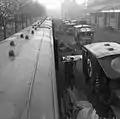 Wounded soldiers being loaded from a number of Austin K2/Y ambulances into a hospital train in Belgium, March 1945. (Note the stripes on the spare wheel cover.)
Wounded soldiers being loaded from a number of Austin K2/Y ambulances into a hospital train in Belgium, March 1945. (Note the stripes on the spare wheel cover.)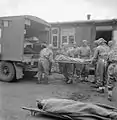 Men of 11 Light Field Ambulance, Royal Army Medical Corps, wearing protective clothing, using an Austin K2/Y ambulance to evacuate an inmate suffering from typhus from Bergen-Belsen concentration camp No 1. By 2 May 1945, 6 500 of the sick had been evacuated to hospital.
Men of 11 Light Field Ambulance, Royal Army Medical Corps, wearing protective clothing, using an Austin K2/Y ambulance to evacuate an inmate suffering from typhus from Bergen-Belsen concentration camp No 1. By 2 May 1945, 6 500 of the sick had been evacuated to hospital.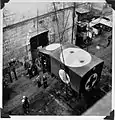 Operation Musketeer, 1956, the invasion of Egypt. An Austin K2/Y ambulance (early version) being lowered from flight deck to dockside.
Operation Musketeer, 1956, the invasion of Egypt. An Austin K2/Y ambulance (early version) being lowered from flight deck to dockside.
References
- Austin K2/Y Ambulance Register.
- Princess Elizabeth 2nd Subaltern 1945 (especially the first 20 seconds) (British Pathé).
- Princess Elizabeth (1945) (especially from 3 minutes 10 seconds) (British Pathé).
- THE MALL VE-VJ PARADE PART TWO (from 8 minutes 14 seconds to the end).
- Sir John and Lady Mills in Colchester together with an Austin K2/Y Ambulance (1994).
- THE MALL VE-VJ PARADE PART ONE (all of it).
External links
- Wounded airmen are taken to an Austin K2/Y ambulance (1943).
- Austin K2/Y war ambulance arriving at emergency services day 2014.
- Vintage Austin K2/Y ambulance walk around (2014).
- Austin K2/Y Ambulance at armyvehicles.dk.
- Ice Cold in Alex Austin K2/Y at the Internet Movie Cars Database.
- Movies and TV-series where Austin K2/Y appears at the Internet Movie Cars Database.